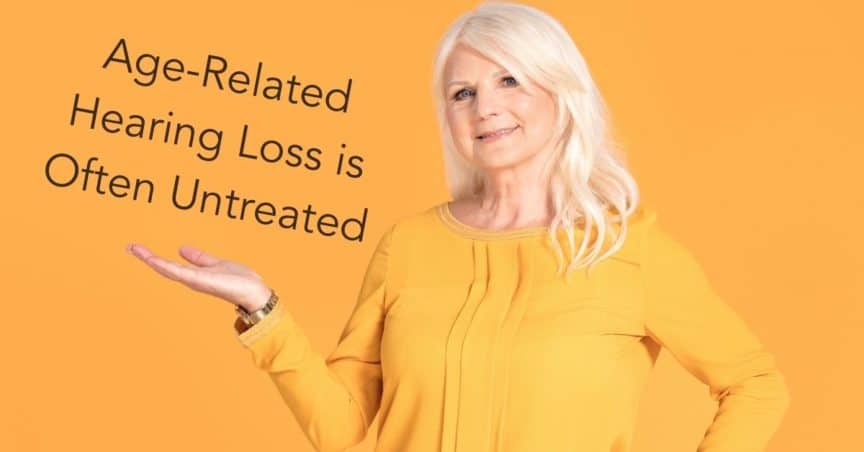- How to Care for Infants With Hearing Loss - April 15, 2024
- Hearing Aid Tips for Runners - April 5, 2024
- Overcoming Misconceptions Around Hearing Aids - March 27, 2024
It’s a fact of aging that all of us will experience hearing loss. Age-related hearing loss can begin as early as 45, but affects ⅔ of people over 70 and virtually 100% of centenarians. While nobody knows exactly why we lose our hearing as we age, we do know that the degree to which we lose it may be modifiable. A healthy diet such as the Alternate Mediterranean diet (AMED) or Dietary Approaches to Stop Hypertension (DASH) can prevent or slow the loss. Quitting smoking is also strongly recommended to avoid severe hearing loss.
Hearing Loss Can Be Dangerous
While we once thought of age-related hearing loss as an annoying and sometimes frustrating aspect of getting older, research over the last 40 years has indicated that hearing loss can lead to a cascade of negative health outcomes, including social isolation, depression, paranoia, problems balancing and even earlier onset of cognitive decline and dementia. Faster-than-normal progress of age-related hearing loss can also be indicative of an underlying cardiovascular problem that may become acute if unaddressed.
Unfortunately, over the same 40-year period, the statistics on hearing loss treatment have not changed: only one out of five people who need hearing aids will get them. On average, a person who does get hearing aids waits an average of seven years from the time they notice hearing loss to do so.
Regular Hearing Tests and Earlier Treatment
The Better Hearing Institute, a non-profit organization, recommends getting a hearing test once every decade until age 50, and once every three years thereafter. The earlier hearing loss is noticed, the more you can do to try to slow it down.
It’s also important to start treating hearing loss earlier. People spend years in frustration over the effects of hearing loss, when hearing aids could restore hearing to near-normal and keep us active and engaged. In fact, over 90% of people who get hearing aids report being happy with them when asked after one year of wearing them.
Changes In the Brain
As hearing loss progresses, our brains start to adjust to it. The auditory cortex actually atrophies as it receives less information from the ears, and the frontal cortex is overstressed as it has to pick up the slack in trying to piece together sentences from incomplete bits of information. Over time, we lose the ability to comprehend speech even when we hear it clearly, which is why some audiologists offer training courses for those new to hearing aids: it takes some work to regain the ability to understand speech. With earlier treatment, this can all be avoided.
What Are the Signs of Hearing Loss?
The first sign of hearing loss is usually no sign at all. Most often, it’s someone close to us that points out our hearing loss when they hear things we don’t, or notice that we don’t respond to them when they speak. Hearing loss, unlike near- or far-sightedness, isn’t very apparent to us because we don’t know we’re not hearing the things we don’t hear. Unfortunately, many people don’t take it seriously enough when someone else points out that we might have hearing loss. All too often, we accuse them of mumbling or tell them to speak up.
We may experience difficulty hearing people when there’s a lot of background noise, and we might notice ourselves becoming fatigued after shorter periods of conversation. Hearing loss is exhausting, and too many people mistake this exhaustion for a separate age-related condition. You may remember people you know saying, “I just can’t go as long as I used to,” as they get older. It may have been that hearing loss was wearing them out, not age. Fortunately, hearing aids can correct this problem.
Hearing Aids Can Help
Some people may avoid getting hearing aids because they see them as a sign of “getting old.” In fact, hearing aids are one of the best ways to continue feeling young. Hearing aids today are smaller, sleeker and more powerful than ever before. They can integrate with Bluetooth and other technologies to improve hearing on the phone, in the car, in museums, movie theaters and more. There are options available for a variety of lifestyles and budgets, so make an appointment for a hearing test today and talk to a member of our team about the options that are best for you.

